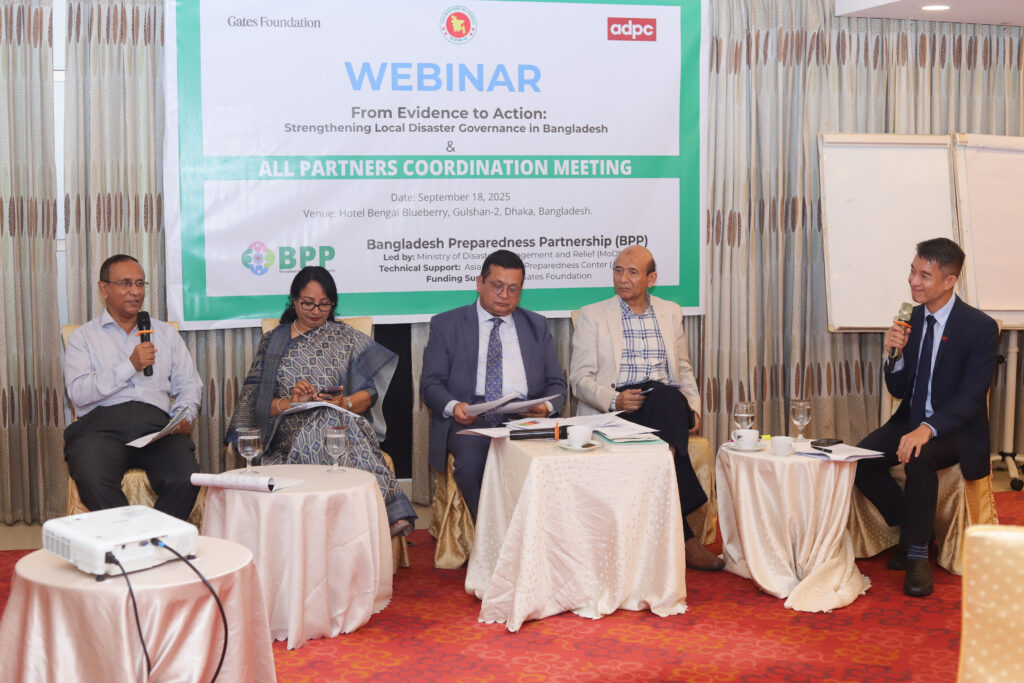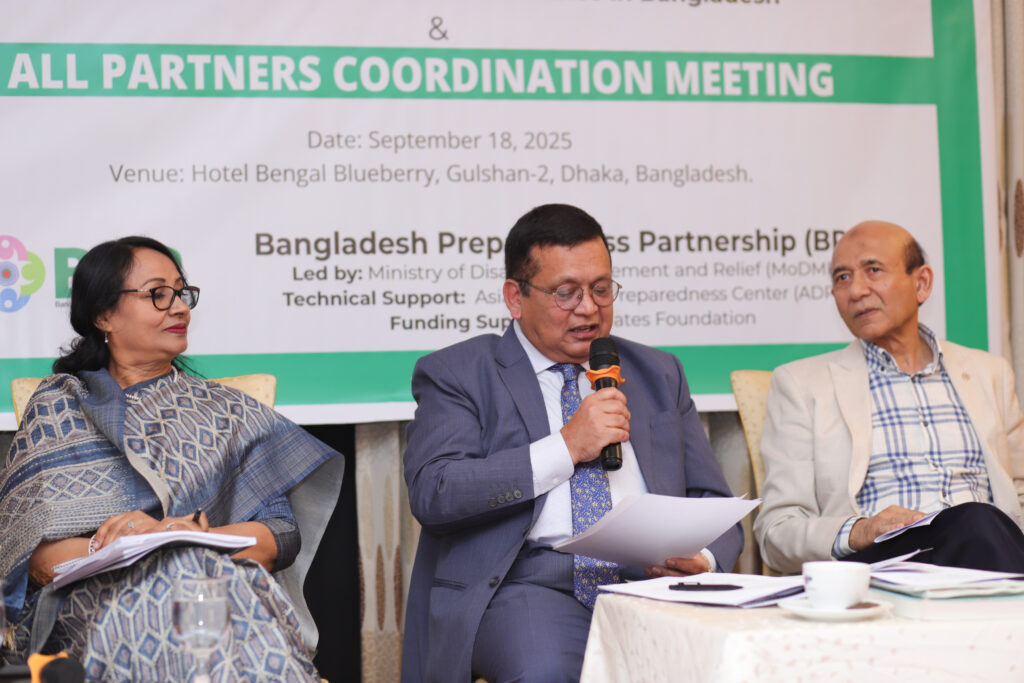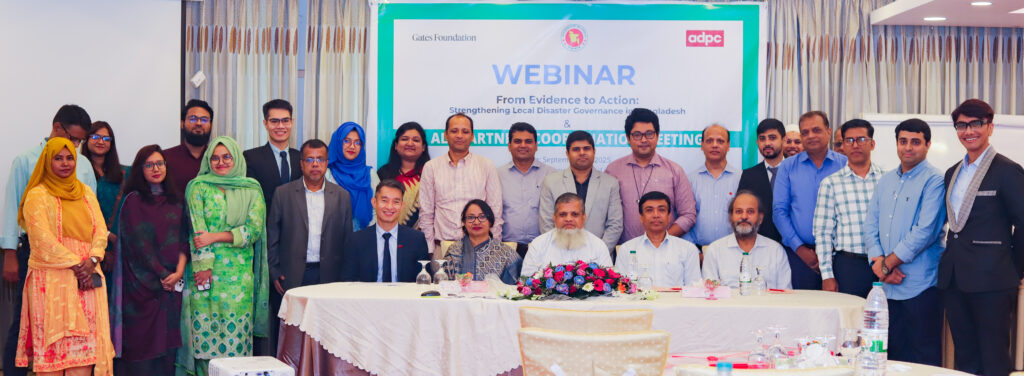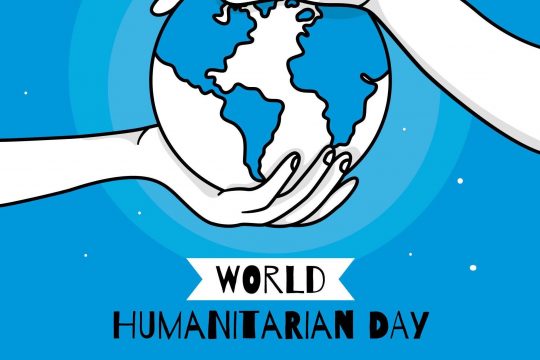Dhaka, 18 September 2025 — The Bangladesh Preparedness Partnership (BPP) organized a hybrid webinar, “From Evidence to Action: Strengthening Local Disaster Governance in Bangladesh,” bringing together government officials, academics, disaster management experts, volunteers, researchers, and civil society leaders from Bangladesh and beyond. BPP is a multi-stakeholder platform led by the Ministry of Disaster Management and Relief (MoDMR), with technical assistance from the Asian Disaster Preparedness Center (ADPC) and funding support from the Gates Foundation.
Among the key speakers were Mr. Md. Mohsin, currently serving as Senior Partnership Advisor at the UN World Food Programme, and formerly Secretary of MoDMR and Chairperson of ADPC Board of Trustee; Mr. Md. Razwanur Rahman, Director General (Additional Secretary) of the Department of Disaster Management (DDM); and Brigadier General (Retd.) Abu Nayem Md. Shahidullah, Advisor to the Federation of Bangladesh Chambers of Commerce and Industry (FBCCI) Safety Council and BPP Private Sector Lead. The session was moderated by Mr. Edwin M. Salonga, Program Lead at ADPC, and the keynote presentation was given by Professor Dr. Mahbuba Nasreen, Lead Researcher of the baseline study and Co-Founder of the Institute of Disaster Management and Vulnerability Studies (IDMVS) at the University of Dhaka.

A Call for Localization, Inclusion, and Coordination
The keynote presentation emphasized the urgent need to fully implement the Standing Orders on Disaster (SOD) 2019 at the grassroots level through inclusive and participatory governance. Based on the findings of the baseline study, key challenges were identified: poor coordination among government agencies, non-government organizations (NGOs), and other stakeholders; unclear roles and responsibilities at the community level; weak institutional capacity at union and ward levels; absence of formal early warning systems; inadequate emergency preparedness; lack of integration of volunteers; and the exclusion of marginalized groups—including women, persons with disabilities, and the third gender—from local disaster management committees. Additionally, limited resources, weak infrastructure, and low levels of community engagement further hinder effective disaster governance. Notably, while the SOD 2019 mandates the formation of Disaster Management Committees (DMCs) at every level, many union and ward-level DMCs lack the capacity and manpower needed to carry out their responsibilities effectively.
To address the gaps, the study proposed practical, evidence-based recommendations. These include simplifying the SOD 2019 and creating user-friendly manuals, institutionalizing regular training with performance tracking, and establishing community stockpiles and contingency funds with quarterly audits. It also recommended setting up district monitoring units and mobile feedback platforms to improve accountability. Inclusivity was emphasized through calls for diverse representation in DMCs and upgrading shelters for accessibility. Improved coordination through clear protocols, aid tracking systems, and regular stakeholder meetings were advised. Lastly, the study urged a revision of the National Plan for Disaster Management (NPDM) based on these findings.
Panel Reflections: From Policy to Practice
Mr. Md. Mohsin provided the historical context for disaster management in Bangladesh. He emphasized that although Bangladesh is internationally recognized for its disaster resilience, the 2012 Disaster Management Act and the still-operational 2019 SOD must be better aligned. He said, “We have the policy instruments. What we lack is alignment at the implementation level, especially locally.” He emphasized the need for a bottom-up approach driven by ground-level feedback. He noted that the SOD 2019 is now six years old, and this baseline study offers a timely opportunity to review it alongside the next NPDM. Meanwhile, Mr. Md. Razwanur Rahman highlighted capacity gaps at the union and ward levels revealed by the study. He stressed, “The government alone cannot manage disasters. We need active involvement from local bodies, civil society, and the private sector through a whole-of-society approach.” He also stressed that, although the government has enacted a rule allowing the creation of local disaster funds, current regulations require any unspent funds to be returned to the central government at the end of the fiscal year. “This must change—these funds should remain at the community level,” he urged

Mr. Abu Nayem focused on the limited inclusion of women, persons with disabilities, and other marginalized groups in disaster planning and decision-making. He noted that these communities are often viewed only as beneficiaries rather than as active contributors to local deve lopment. Barriers such as cultural norms, lack of mobility, inaccessibility, and absence of disaggregated data contribute to their exclusion. His recommendations included reserving seats for marginalized groups in DMCs, promoting gender-sensitive early warning systems, and building an inclusive data ecosystem. “We need sex- and disability-disaggregated data to ensure resources and training are reaching the right people.”
Institutionalizing Best Practices
The panel discussed good practices and institutional reforms needed for revising the SOD 2019 and the NPDM 2026-2030. Mr. Mohsin called for joint simulation exercises, greater use of ICT and AI tools, and stronger emphasis on local-level assessments. He highlighted the Cyclone Preparedness Programme (CPP)—with a total of 78 548 volunteers, 50% of whom are women—as a model of community engagement.
Expanding on this, Mr. Rahman shared that a recent flood response initiative in six sub-districts successfully empowered local communities to identify and plan for their own disaster needs. He emphasized that such community ownership, supported by local NGOs and elected bodies, is crucial for sustainable disaster governance.
Mr. Nayem proposed the institutionalization of a multi-stakeholder coordination platform, formally linked to both the SOD 2019 and the NPDM. He also recommended engaging the private sector as first responders, creating local disaster resilience funds, and expanding successful models like the BPP, which brings together business actors and local institutions to improve disaster preparedness.

Emerging Issues and Strategic Recommendations
The webinar synthesized the study’s findings into key emerging issues and actionable recommendations:
- Revise the SOD 2019 and the NPDM based on grassroots feedback, shifting from cyclone-centric to multi-hazard approaches.
- Ensure effective SOD implementation with regular monitoring.
- Integrate disaster preparedness into business continuity.
- Conduct joint local simulations and expand training to union and ward levels;
- Use ICT and AI for early warning and response; provide gender-sensitive Bangla materials;
- Reserve DMC seats for women and vulnerable groups; develop inclusive data systems and promote leadership among vulnerable groups;
- Strengthen partnerships among government, private sector, academia, and communities;
- Continue BPP dialogues and simplify SOD roles for clarity and accountability.
- Adapt international best practices locally;
- Ensure reserved representation in DMCs and collect disaggregated data;
- Focus training beyond the district level, targeting the union and ward levels; and
- Formalize collaboration through institutional platforms linked to the SOD 2019 and the NPDM, promoting inclusive governance and community engagement.
Closing Reflections: A Turning Point for Disaster Governance
The webinar marked more than just a presentation of findings—it was a turning point in the conversation around local disaster governance in Bangladesh. The evidence is clear: policies are in place, but practice needs alignment. Inclusion is recognized, but not yet fully realized. Coordination is valued, but still fragmented at the grassroots.
As Bangladesh prepares to develop the next NPDM (2026–2030) and update the SOD 2019, the insights from the baseline study and the voices heard at the webinar provide a timely evidence base to inform reform and drive impact.


